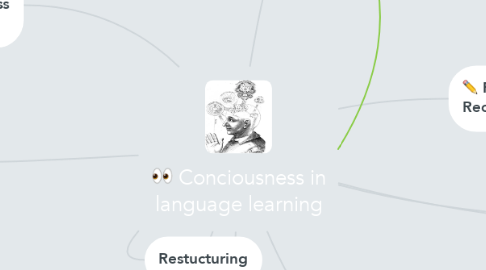
1. "Cognitive development is an outcome of underlying structural changes the cognitive system." (Piaget)
1.1. IL is not linear. U-shaped development
2. Process in which learners reorganize their InterLanguage in the light of new evidence about Target Language (Batstone)
3. Types of Conciousness (Schmidt)
3.1. Awareness
3.1.1. "Noticing is not sufficient for learning (...) noticed language has to be incorporated into the learner's hypoteses on how grammar si structured" (Batstone, 1994)
3.2. Intention
3.3. Knowledge
4. Consciousness of input
4.1. Salience
4.1.1. Input enhancement
4.1.2. Instruction
4.2. Limited Capacity Processing
4.2.1. Attention to form vs Attention to meaning
4.3. Noticing the Gap
4.3.1. "Students need to make comparisons of their current state of their IL and the input" (Schmidt and Frota)
5. Restucturing
6. Reformulation
7. Text produced by student
7.1. Then reformulated by teacher for comparison
8. Noticing. Implications for the classroom.
8.1. The item to be noticed should be:
8.1.1. Significant
8.1.2. Salient
8.1.2.1. Highlighting graphically
8.1.2.2. Forcing engagement
8.1.3. Frequent
8.1.3.1. A learning diary
8.1.4. Attention to processing of form
8.1.5. Not simultaneous attention to processing of meaning
8.1.5.1. Do not demand instant manipulation
8.1.6. Time to notice
8.1.6.1. Opportunities for re-noticing
8.1.6.2. Developing noticing skills
9. Reformulation & Reconstruction
9.1. Reconstruction
9.1.1. Text provided by teacher
9.1.1.1. Students reconstruct original text
